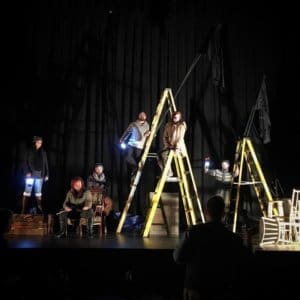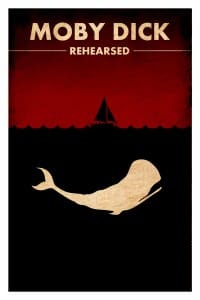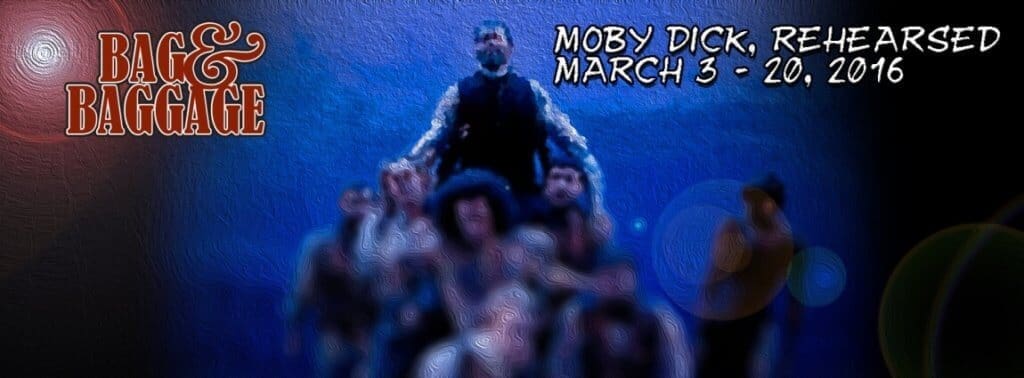- Skip to primary navigation
- Skip to secondary navigation
- Skip to main content
- Skip to primary sidebar
Jumping Into Deep Water- Scott’s Moby Dick Blog
 In my preparation for this show, I found myself consistently drawn to a single word that appears over and over and over again during the course of more than 150 years of criticism of Moby-Dick.
In my preparation for this show, I found myself consistently drawn to a single word that appears over and over and over again during the course of more than 150 years of criticism of Moby-Dick.
Imagination.
“Moby-Dick is Melville’s imagined world…”
“Moby-Dick engages the reader’s imagination…”
“Ahab is more than we could imagine and only as real as our imagination could make him…”
“Ahab himself seeks more than what is given to him…he imagines for himself something more than reality…”
“Ishmael imagines himself a narrator, imagines for himself a role in the story that is unlike any reality of viewer or witness…”
Harold Bloom said, “Moby-Dick is not a novel. It is an imaginative miracle.”
It is a massive, bulky, colossal, terrifying, majestic, and ultimately unfathomable thing. It is the physical representation of one man’s will, one artist’s transcendent vision, an entire internal universe externalized on the page and written as an act of desperate need in the face of sustained gale force winds. It is really, really long and complicated and scary. Yipes.
Which is why I am so happy we aren’t performing Melville’s Moby-Dick. Instead, we are doing the only slightly less terrifying adaptation by Orson Welles. Instead of trying to present a whole wide world on stage, we are just presenting a single massive continent; much, much easier.
 And Welles’ vision of Moby-Dick is, in fact, one that focuses on that key aspect of Melville’s universe that is so much a part of more than a century of critical response: the imagination.
And Welles’ vision of Moby-Dick is, in fact, one that focuses on that key aspect of Melville’s universe that is so much a part of more than a century of critical response: the imagination.
Samantha Ellis, in her 2004 article about Moby Dick, Rehearsed, wrote, “By 1955, Orson Welles was already a monolith. At that stage of his career it is absurd to expect Orson Welles to attempt anything less than the impossible. It is all that is left to him. Mere possible things, like Proust or War and Peace, would confine him. He must choose Moby-Dick, a book whose setting is the open sea … and whose villain is the supremely unstageable whale.”
Welles spent 8 years working on his adaptation of Moby-Dick.
8 years.
While also, you know, co-writing and directing Citizen Kane, The Magnificent Ambersons (which he produced, wrote, and directed), filing a quasi-documentary in South America, producing a massive failure of Jules Vernes’ Around the World In 80 Days that nearly bankrupted him personally, creating one of the most enduring visions of Shakespeare’s Macbeth in 1947, which he shot in only 23 days, produce a live television broadcast of a major adaptation of King Lear, staged by Peter Brooke, another series of short documentaries in 1955, appeared in the John Huston film version of Moby-Dick, finished his own adaptation of the novel wherein he starred as both Father Mapple and Ahab before starting work on Touch of Evil, considered by most to be his crowning artistic achievement.
This 8 year period makes me feel like an enormous failure as a human being and an artist. Orson Welles – what a show off!
 Here is my favorite thing ever said about Orson Welles, from Orson Welles: The Rise and Fall Of An American Genius by Charles Higham: “It was this quality of visionary dreams that gave a devastating force to his creations…in which blood, fire, and brutality dominated the theatre for an evening and left the audience exhausted and exhilarated all at once. It was his ambition, and ambition in which he succeeded, to take the actors with him through the dark tunnel of his imagination, milking them of emotion, making them the slaves of his dreamings. None who worked with him would ever forget the experience, and none would ever quite match it again.”
Here is my favorite thing ever said about Orson Welles, from Orson Welles: The Rise and Fall Of An American Genius by Charles Higham: “It was this quality of visionary dreams that gave a devastating force to his creations…in which blood, fire, and brutality dominated the theatre for an evening and left the audience exhausted and exhilarated all at once. It was his ambition, and ambition in which he succeeded, to take the actors with him through the dark tunnel of his imagination, milking them of emotion, making them the slaves of his dreamings. None who worked with him would ever forget the experience, and none would ever quite match it again.”
Moby-Dick, Rehearsed was both a hit and not a hit when it premiered in 1955. As a work of “theatrical imagination,” it was pure genius. As a vehicle for Welles himself, not so much. Critics found his approach…well, a little ham-fisted. But what was so remarkable about it was its pure inventiveness, the sheer imaginative scale, the way in which the script demanded of both actor and audience a fully engaged imagination.
JC Trewin said, “The play gets us to use our imaginations as fiercely as they have been used in the theatre for some time.”
Welles, in my opinion, did some very specific things with Melville’s fish story in the 8 years he had to fiddle with Moby-Dick.
First, he rewrote it completely, eliminating massive amounts of content, to fit more purposefully with the story of King Lear and, like his previous experience with Lear, he did so in a pretty truncated fashion. His interest was in exploring the obsession of the great man, the implications of madness, and the power and influence of a larger-than-life King with an unremorseful drive, irrespective of who or what is destroyed in the process.
Second, he re-focuses the material of Melville’s writing on Melville’s poetry. Welles’ verse is unrepentantly poetic. It is a kind of stand forth and declaim poetic style, very familiar to Shakespearean actors and audiences in its complexity, layering and density but not in its action. For that, he asks for the patience and good sense of the acting company.
Finally, he embraces the hilarity, the stupidity, the full-blown madness of the notion of putting a whale in a theatre. There is no apology for this choice; in fact, Welles is aggressive in it…he frames the idea as a thought experiment, as a research challenge – basically saying “No idea if this is going to work or not, but by god we are going to give it a go. Hold on and dive in. Close your eyes and jump.”
Which is exactly what I hope this cast and our audiences will do. Like Melville and Welles before us, we are not going to hesitate to tell this story. No time to wonder if it will work, if it is right, if it will ever be finished or successful or acclaimed or make us money. Not relevant. We are going to, through the sheer force of will and the power of our creative vision, tell a really amazing fish story.
It’s why we do this. There isn’t any other reason to do it. There isn’t any other way we make art that lasts beyond us.
One final note of thanks to the Welles Estate for their generosity in granting us permission to cast a woman in the role of Ahab. It has always been my feeling that women in the theatre have too long been denied an opinion on the nature and meaning of some of the greatest, most iconic, and most complex characters in classic dramatic literature – who also happen to be male. Thanks to the Welles estate for agreeing with us and allowing these remarkable women the chance to exercise their own imaginations (and our audiences’) by exploring roles like Ahab and Ishmael. It truly does give us a whole new insight into these iconic figures from our literary past.


O.K. A whale is NOT A FISH, it is a mammal, that is the correct species. A trout is a fish, a shark is a fish. Whales, porpoises etc are not FISH.
So I hope it will be a whale of a story and a whale of a success. Not doubt that will be.
Within the context of the story, it is still debated as to the exact classification of whales, and Ishmael, the narrator, sides strongly in favor of classifying them as fish; therefore, while you are correct in stating that whales are mammals, withing the narrative they are considered fish, and it is perfectly acceptable to refer to this play as a fish story as a result.
However, whether they are fish or mammals, this is still going to be a whale of a story.
I saw a wonderful production of this play at Herman Melville’s estate, Arrowhead, in 1982. The harpooneers and Pip were played by women. It was spectacular– staged out in a field at night with Mount Greylock, which Melville saw as a kind of stand-in for the whale, looming on the horizon. I look forward to seeing your production!